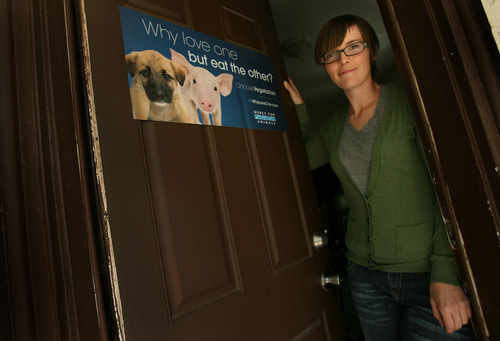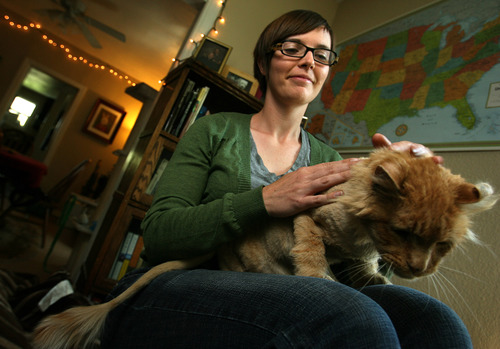This is an archived article that was published on sltrib.com in 2013, and information in the article may be outdated. It is provided only for personal research purposes and may not be reprinted.
One day after the case made headlines, Draper prosecutors have dismissed a misdemeanor against an animal-welfare activist who filmed a Utah slaughterhouse.
Prosecutors on Tuesday dropped the case against Amy Meyer, who had faced a class B misdemeanor for agricultural-operation interference. Prosecutors filed the charge in Draper's justice court Feb. 19 after Meyer used her cellphone to record the Dale T. Smith and Sons Meat Packing Co. 11 days earlier.
The case was the first to be prosecuted under Utah's "ag gag" law, which passed the state Legislature in 2012. Under the law, it became illegal to record an agricultural operation while trespassing or entering the premises on false pretenses.
Prosecutor Benjamin Rasmussen said his office moved to dismiss the case after he received new evidence during a hearing April 18. At the hearing, Rasmussen explained, Meyer, 25, provided video footage showing that she was on public property during at least some of the time she was recording the slaughterhouse. Rasmussen added that other footage left Meyer's position ambiguous but he nevertheless decided to drop the case.
"I determined that in interest of justice I wouldn't pursue the matter," he said.
Meyer said Tuesday evening that she had been confident in her case but was relieved by the dismissal.
"I thought it might take more of a fight," she added.
The dismissal comes a day after the case shot to national attention. Monday morning, a journalist broke the story in a piece about Meyer on the website Green is the New Red. Meyer's defense attorney, Stewart Gollan, said later in the day that he had received numerous inquires about the case from national and Utah media.
Rasmussen said the media interest did not have bearing on his decision to dismiss the case. He also said that he believes the case was originally screened by his office for agricultural-operation interference charges at the request of the officer who filed the initial report.
Prosecutors have the option to refile the case if new evidence turns up, though Rasmussen said he does not anticipate doing that.
Meyer had previously pleaded not guilty to the charge. Both she and Gollan argued she never left public property and, therefore, never broke the law. Meyer was aware of the "ag gag" law while visiting the slaughterhouse, she said, and for that reason chose to stay on public property.
Meyer explained Tuesday that she became an animal rights activist and vegan after learning about the conditions in factory farms. She said her case offers a lesson for other states that once on the books, "ag gag" can lead law enforcement to "file charges first and ask questions later." She also said people deserve to know where their food is coming from.
In an email signed only by a "spokesperson" for Dale T. Smith and Sons Meat Packing Co., the company states that it "noted possible trespassers." When the trespassers refused to leave, the email states, the company contacted authorities.
Dale T. Smith and Sons Meat Packing Co. is partially owned by Draper Mayor Darrell H. Smith. He did not respond to messages left Monday and Tuesday seeking comment.
In a written statement, Meyer said she observed upsetting examples of animal cruelty at the slaughterhouse, as well as piles of horns and flesh spewing out of a building. She added Tuesday that she was surprised to find the scene in "our own backyard."
Gollan acknowledged that the case had generated significant media interest but said he accepted prosecutors explanation that they dismissed the case over evidentiary concerns. He also said that the law appears to aimed at preventing people from gathering information "that would fuel public debate" about certain kinds of businesses.
Twitter: @jimmycdii







